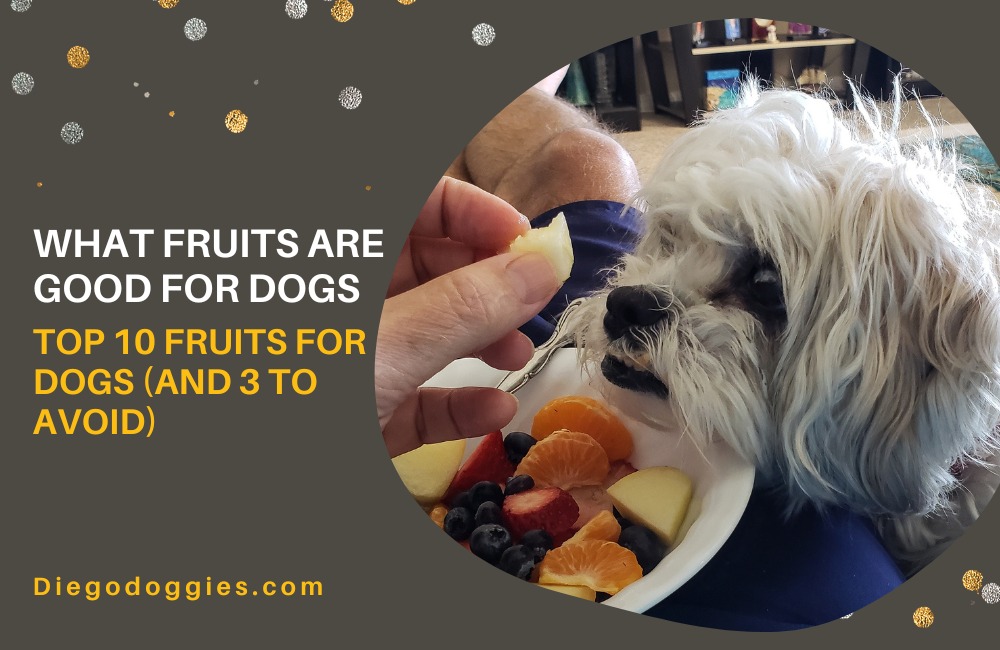If you own a dog, you are aware of the dog’s love of food. What is not to love, then? Fruits are nutritious and delicious! Apples, Bananas, Blueberries, Cantaloupe, Cranberries, Grapefruit, Watermelons, Kiwi, Mangoes, and Oranges are safe fruits for dogs to eat.
In this blog post, we will list the 10 best fruits for dogs and 3 fruits that should be avoided.
Ten fruits Are Good for Dogs
Apples: Apples are a great source of fiber and vitamins A plus C and should be eaten in moderation. Although they can eat apples the core and seeds should be removed. The seeds can be toxic to dogs.
Bananas: Bananas are also a good source of fiber and are packed with potassium, vitamins, and minerals. They are also high in sugar and should be given as a treat.
Blueberries are rich in antioxidants and fiber and can help to support your dog’s digestive system.
Cantaloupe: Cantaloupe is a great source of water and vitamins A and C. It can help to keep your dog hydrated and their skin healthy.
Cranberries: Cranberries are also high in antioxidants and can help to protect your dog’s urinary tract. Grapes and raisins are a big no-no for dogs as they can cause kidney problems.
Kiwis: Kiwis are a good source of fiber and vitamins C and E. They can help to keep your dog’s digestive system healthy and their skin moisturized.
Mangoes: Mangoes are rich in vitamins A, C, and E. They can help to boost your dog’s immune system and keep their skin healthy. The seed should be removed before giving a mango to a dog.
Watermelons: Watermelons are a great source of water and vitamins A, B6, and C. They can help to keep your dog hydrated and their energy levels up.
Strawberries: Strawberries are rich in fiber and vitamins C and K. They can help to regulate your dog’s blood sugar levels and keep its digestive system healthy.
Blueberries: Blueberries are rich in antioxidants and can help to boost your dog’s immune system.
Orange: Oranges are a good source of fiber and vitamin C. They can help to keep your dog’s digestive system healthy and their skin moisturized. However, peel the orange first as the peel can upset a dog’s stomach
3 Fruits to Avoid
Avocados: Avocados contain a chemical called persin which can be toxic to dogs.
Cherries: Cherries contain a substance called cyanide which can be poisonous to dogs in large quantities. Because of this, it is best to avoid giving cherries to your dog altogether.
Grapefruit: Grapefruit contains a chemical called psoralen which can be toxic to dogs. If ingested in large quantities, grapefruit can cause vomiting, diarrhea, and even death.
What Benefits Do Fruits Bring To Dogs?
Fruits are a great source of fiber, vitamins, and minerals. They can help to keep your dog’s digestive system healthy and regulate their blood sugar levels. Additionally, some fruits are rich in antioxidants which can help to boost your dog’s immune system.
Fruits are a wonderful supplement to the diet of any dog. If the fruit is not harmful, it is safe to share a slice with your dog when you are eating fruit.
How Much Fruit Can I Feed The Dog
The amount of fruit you feed your dog will depend on their size and activity level. You should offer your dog no more than 10% of their daily calories from fruit.
For a 50-pound dog, which would be about ¼ cup of blueberries or ½ a large banana. If your dog is not a fan of fruit, you can try mixing it with their regular food or hiding it in a Kong toy. You can also try freezing fruits to make them more appealing to your dog.

Conclusion:
What fruits are good for dogs- There are a variety of fruits that are safe and healthy for dogs to eat. While all these fruits offer some health benefits, apples and blueberries are especially good for dogs because they contain high antioxidants. If you are unsure about what fruits are safe for your dog to eat, always consult with your veterinarian first.
Related Contents
- 11 Important Tips To Help Your Dog Lose Weight and Become Healthier
- 11 Types of Dog Tails and What They Mean
- 12 Swimming Safety Tips for Your Dog
- 14 Ways to Help Keep Your Dog Happy and Healthy
- 15 Tips to Keep Your Senior Dog Healthy As They Age
- 17 Tips for Hiking and Backpacking With A Dog
- 5 Reasons Why Your Dog Needs a Dog Life Jacket
- A Step-By-Step Guide To Removing A Tick From Your Dog
- Collars Versus Harnesses for French Bulldogs
- Cutting a Dog’s Nails: How to Prevent Bleeding
- Dachshund Health Problems and How to Prevent Them
- Dog Itchy Skin Home Remedies
- Dog Obesity: How to Help Your Dog Lose Weight and Stay Healthy
- Dog Pregnancy Guide: Signs, Care And Preparation
- Dog Symptoms: 11 Signs of Illness in Your Dog
- Dog Teeth Cleaning in San Diego: The Pros and Cons
- Flea Control for Dogs: Chemical Products vs Natural Remedies
- Flea Treatment for Dogs- What Is the Best Flea Treatment For Dogs
- Guide For Preventing Hip Dysplasia In Golden Retrievers

